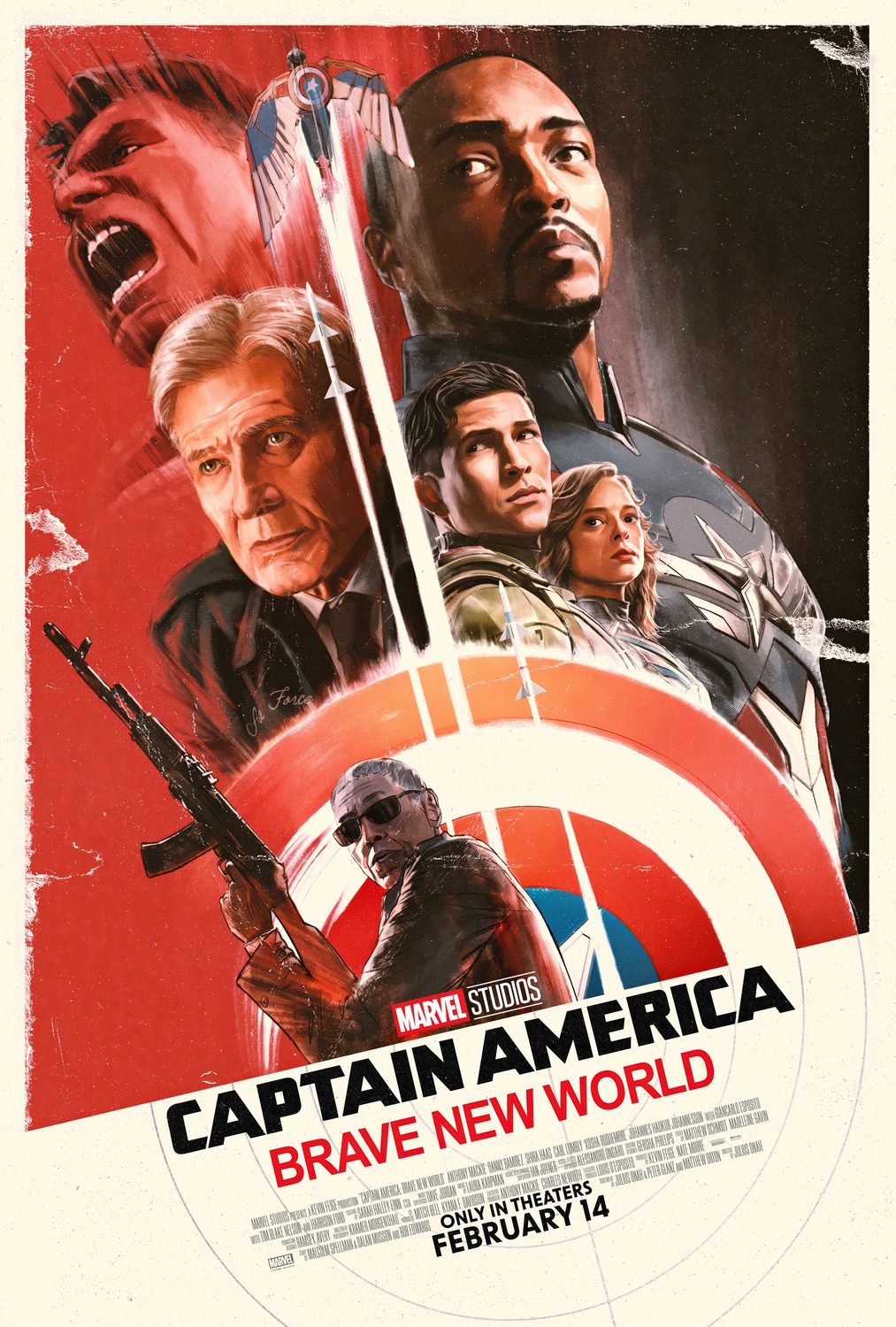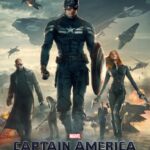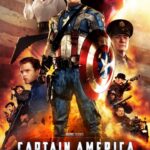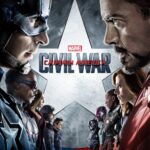Director
Julius Onah
Starring
Anthony Mackie
Harrison Ford
Danny Ramirez
Tim Blake Nelson
Following the events of Eternals, the deceased celestial mass in the Indian ocean is being claimed by different sovereign nations. In an attempt to maintain peaceful order and divide the spoils equitably, newly elected President Ross [Ford] tries to negotiate a treaty of cooperation. However, all of that is sent into a spiral when former super soldier Isaiah Bradley [Carl Lumbly] is revealed to be a mind-controlled sleeper agent and tries to assassinate the president. As such, it’s up to Captain America, Sam Wilson [Mackie], to investigate and ascertain who is really pulling the strings from the shadows.
Leaving the cinema, it was evident this movie was subject to a hefty amount of rewrites and recuts; with little narrative flow woven into its core. Not only does this movie feel like it largely existed on sound stages and green screens but it races through events with little rhythm, winding up a wholly formulaic unfolding. The CGI feels lacklustre, the action is functional but lacks passion and flare, and the score sort of blasts its way through, ignorant of on-screen events (only briefly coming alive during the Red Hulk fight). In other words, this is a technically drab movie. A functional experience that feels perfunctory and apathetic.
But to address the story issues we need to talk about something outside of the film. You see, when Doctor Strange and the Multiverse of Madness was released, all the character development and compelling narratives of WandaVision were either dismissed or given a complete retread. Later it was revealed that, bafflingly, the film writers never really bothered to watch the show to sew the connective tissue and forged their own path. Regrettably, Brave New World suffers the same fate. The series The Falcon and The Winter Soldier was reasonably compelling, took an interesting narrative stance, and posed some very poignant questions about being good enough to inherit an established and beloved mantle. In this big screen outing, Sam’s story feels reheated and tacked-on to a mishmash of franchise loose threads: Tim Blake Nelson returning for the first time in 17 years, Eternals destabilising the world-building but the consequences going unmentioned, the release of Black Widow agents with the fall of the Red Room – not to mention Giancarlo Esposito given a completely pointless henchman role that wastes his talent. It’s all very bitty.
That isn’t to say it’s the fault of the actors. I genuinely feel a wave of pity for Anthony Mackie. The man has been a solid supporting component of the MCU for over a decade and yet when he’s given centre stage, the scripts and plotting are uninspired and messy. Same goes for Ramirez as the new Falcon, Joaquin Torres. He’s got all the heart and zeal of a classic side-kick character but the development is cliche and predictable. But the truly fascinating move is replacing the late William Hurt with Harrison Ford. You could talk me through the rationale for hours and I still wouldn’t necessarily get it. Not only for the differentiation of performance and delivery style between the two actors, but for the insistence of this plot device being the best story for a fourth Captain America movie.
**spoilers throughout this paragraph**
The decision to recast Thaddeus Ross and continue his story – despite his presence being a handful of noteworthy cameos – feels remarkably forced. Given Hurt’s death was less than three years ago, it’s likely this script was always the plan. But with so much hinged on the slow-burn background lore and canon, the reveals and references don’t land with any weight. Subsequently, while hiring a new actor to fill a role is entirely normal for the industry (need I even mention Edward Norton or Terence Howard?), given the sprawling nature of this episodic franchise, this film suffers from it. It’s as if we’re on the fifteenth season of a long running show and a character from the first season returns with a new face, yet we’re supposed to feel the impact. It simply doesn’t land. And that’s not restricted to Ross; the focus on Betty hardly feels earned considering she’s been little more than a throwaway line for so long and has yet to share screen time with the current actor playing Bruce Banner. And speaking of Banner, I fully believe that a Deus ex Hulk would have been a colossal mistake and would have robbed Mackie of his stage – but to tell such a Hulk-infused story without bringing a Banner into the proceedings comes off as incomplete. A fact which is accentuated given how anti-climactically the Red Hulk battle ends and how bluntly the resolution was signposted earlier in the movie.
In certain psychological thrillers, there comes a point where the ruse has run its course and the charade falls away, the urgency dies, and the protagonist is left to their own devices to end the story. Take the ending of Vanilla Sky for example. This whole film feels like that moment of capitulation. You can throw all the bluster around that you want, insisting the spectacle means something but with the curtain drawing closed, there’s just an exhalation of surrender; a sense that no amount of CPR is going to change reality. And frustratingly, there’s a good film in here – Wilson persevering to earn his station, Captain America going against a compromised government, the Red Hulk transformation itself being satisfying – it’s just buried under sleepwalking indifference. It’s not enough to bring down the MCU but it’s a clear reminder that not every Marvel film is constructed with the same care and consideration.
Release Date:
14 February 2025
The Scene To Look Out For:
There’s only so many times you can execute the same threat before it becomes ridiculous. It’s a sort of unspoken rule of farce: just keep doing the serious thing repeatedly until it becomes funny because it’s so absurd. Throughout this film there are Manchurian Candidate style triggers that turn enlisted allies into cold blooded killers. The trouble is, it’s often through the playing of one late 50s song. And every time the stage is set for tension, you end up waiting for a speaker or radio to start blasting out the song and the severity is stripped away and what’s left is simply laughable. A prime example of “we had one idea and we just copy-and-pasted it throughout the script.”
Notable Characters:
**spoilers**
For those who don’t remember 2008’s The Incredible Hulk Tim Blake Nelson played scientist Samuel Sterns, who is infected with Bruce Banner’s blood and was teased in the film’s conclusion as a villain to return in the sequel. 17 years later, he’s back. Turns out he was incarcerated this whole time and being experimented on by Ross – only to bide his time and turn the tables. On paper, I’m not opposed to this and there is a sense of catharsis and closure to the closing of this loop. But in reality, it’s been too long. This isn’t a Toby Jones stark revelation in Captain America: The Winter Soldier, it’s more akin to feeling lost in class because you didn’t do the required reading.
Highlighted Quote:
“Should’ve taken that serum, Bucky’s full of shit.”
In A Few Words:
“Bland and forgettable, Disney have really let Mackie down.”
Total Score: 2/5

![The Red Right Hand Movie Reviews [Matthew Stogdon]](https://reviews.theredrighthand.co.uk/wp-content/uploads/2021/12/cropped-header1.png)



